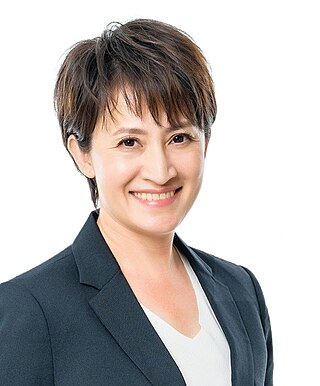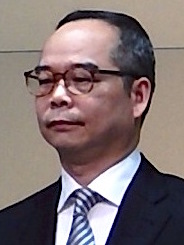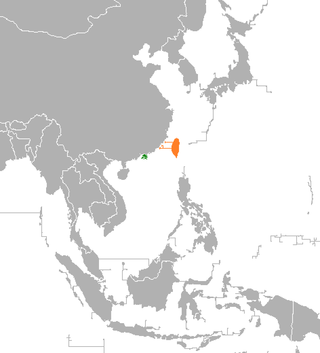
The Democratic Progressive Party (DPP) is a Taiwanese nationalist and centre to centre-left political party in Taiwan. It is currently the major ruling party in Taiwan, controlling both the presidency and the central government, also the dominant party in the Pan-Green Coalition.

The Democratic Party (DP) is a liberal political party in Hong Kong. The party generally sits at the centre to centre-left of the Hong Kong political spectrum. Chaired by Lo Kin-hei, it is the flagship party in the pro-democracy camp and currently has no elected representatives in the District Councils.

Martin Lee Chu-ming is a Hong Kong politician and barrister. He is the founding chairman of the United Democrats of Hong Kong and its successor, the Democratic Party, Hong Kong's flagship pro-democracy party. He was also a member of the Legislative Council of Hong Kong from 1985 to 1997 and from 1998 to 2008. Nicknamed the "Father of Democracy" in Hong Kong, he is recognised as one of the most prominent advocates for democracy and human rights in Hong Kong and China.
Ideological debate over democracy in China has existed in Chinese politics since the 19th century. Chinese scholars, thinkers, and policy-makers have debated about democracy, an idea which was first imported by Western colonial powers but which some argue also has connections to classic Chinese thinking. Starting in the mid-eighteenth century, many Chinese argued about how to deal with Western culture. Though Chinese Confucians were initially opposed to Western modes of thinking, it became clear that aspects of the West were appealing. Industrialization gave the West an economic and military advantage. The Qing dynasty's defeats in the First and Second Opium Wars compelled a segment of Chinese politicians and intellectuals to rethink their notion of cultural and political superiority.

The International Republican Institute (IRI) is an American nonprofit organization founded in 1983 and funded and supported by the United States federal government. Most of its board is drawn from the Republican Party. Its public mission is to advance freedom and democracy worldwide by helping political parties to become more issue-based and responsive, assisting citizens to participate in government planning, and working to increase the role of marginalized groups in the political process, including women and youth. It has been repeatedly accused of foreign interference and has been implicated in the 2004 Haitian coup d'état. It was initially known as the National Republican Institute for International Affairs.

The National Democratic Institute (NDI) is a non-profit American non-governmental organization whose stated mission is to "support and strengthen democratic institutions worldwide through citizen participation, openness and accountability". It is funded primarily by the United States and other Western governments, by major corporations and by nonprofits like the Open Society Foundations.

Hsiao Bi-khim is a Taiwanese politician and diplomat. She is the vice president-elect of Taiwan following the 2024 Taiwanese presidential election, and will become Taiwan's first biracial vice president. Previously, Hsiao was a member of the Legislative Yuan from 2002 to 2008 and again between 2012 and 2020. She served as the Taiwanese representative to the United States from 2020 to 2023.

The pro-democracy camp, also known as the pan-democracy camp, is a political alignment in Hong Kong that supports increased democracy, namely the universal suffrage of the Chief Executive and the Legislative Council as given by the Basic Law under the "One Country, Two Systems" framework.

Ray Lau Kong-wah, JP, also called Ray Lau, is a former Hong Kong Government official and former member of both the Legislative Council and the Executive Council. Until 2020, he was Secretary for Home Affairs.

The Liaison Office of the Central People's Government in the Hong Kong Special Administrative Region is the representative office of the State Council of the People's Republic of China in Hong Kong. It is located in Sai Wan, Hong Kong Island, Hong Kong.

The Civil Human Rights Front (CHRF) was an organisation that focused on the issues of Hong Kong politics and livelihood, affiliated with almost all pan-democratic camps in Hong Kong. It was founded on 13 September 2002 and disbanded on 15 August 2021.

Keiji Furuya is a Japanese politician of the Liberal Democratic Party, a member of the House of Representatives in the Diet of Japan.

Democratic reforms in Hong Kong did not seriously begin until 1984 and has faced significant challenges since 2014. The one country, two systems principle allows Hong Kong to enjoy high autonomy in all areas besides foreign relations and defence, which are responsibilities of the central government. Hong Kong's Basic Law allows residents to vote for local district councillors and directly elect about half of the region's legislators (LegCo) at the time.

The pro-Beijing camp, pro-establishment camp or pro-China camp is a political alignment in Hong Kong which generally supports the policies of the Beijing central government and the Chinese Communist Party (CCP) towards Hong Kong. The term "pro-establishment camp" is regularly in use to label the broader segment of the Hong Kong political arena which has the closer relationship with the establishment, namely the governments of the People's Republic of China (PRC) and the Hong Kong Special Administrative Region (HKSAR). Pro-Beijing politicians are labeled "patriots" by pro-Beijing media and "loyalists" by the rival pro-democracy camp.

The 1991 Hong Kong Legislative Council election was held for members of the Legislative Council of Hong Kong (LegCo). The election of the members of functional constituencies was held on 12 September 1991 and the election of geographical constituency seats was held on 15 September respectively. It was the first ever direct election of the Legislative Council in Hong Kong history. There were 18 members from directly elected geographical constituencies, 21 members from functional constituencies, 17 members appointed by the Governor, and 3 official members.
Liberalism has a long tradition as an economic philosophy since the founding of Hong Kong as an entrepôt which cherishes private property, the free market, and free trade. In recent decades, Hong Kong has earned its international reputation as one of the "freest economies in the world". As a political trend, liberalism has become the driving force of the democratic movement since the 1980s which is mainly represented by the pro-democracy camp which strives for the universal suffrage, human rights and rule of law in Hong Kong.
Conservatism in Hong Kong derives from the Chinese tradition of familism and Confucianism and was incorporated into the colonial government's policies by Governor Cecil Clementi in the 1920s in the wake of rising Marxism–Leninism and communism in general. The anti-communist sentiments continued after the Second World War when waves of Chinese refugees fled to the colony as the Chinese Communist Party (CCP) swept across Mainland China in the renewed Chinese Civil War. At this time, Conservatives supported the Republic of China (ROC), and were pro–Kuomintang (KMT). After the de facto end of the Chinese Civil War in 1949 when the ROC government fled to Taiwan and throughout the Cold War, Conservatives have also taken libertarian thoughts on economic policies.

The pro-Republic of China camp, or the pro-Kuomintang camp (親國民黨派), is a political alignment in Hong Kong. It generally pledges allegiance to the Republic of China (ROC) in Taiwan and the Kuomintang.

Relations between the government of Hong Kong and the Republic of China (Taiwan) encompass both when the Republic of China controlled mainland China, and afterwards, when the Republic of China fled to Taiwan.

The 2021 Hong Kong electoral changes were initiated by the National People's Congress (NPC) on 11 March 2021 to "amend electoral rules and improve the electoral system" of the Hong Kong Special Administrative Region (HKSAR) for its Chief Executive (CE) and the Legislative Council (LegCo), in order to ensure a system in which only "patriots", according to the Chinese definition, govern Hong Kong. The reforms have been widely criticized for their negative impact on the democratic representation in the Hong Kong legislature.
















